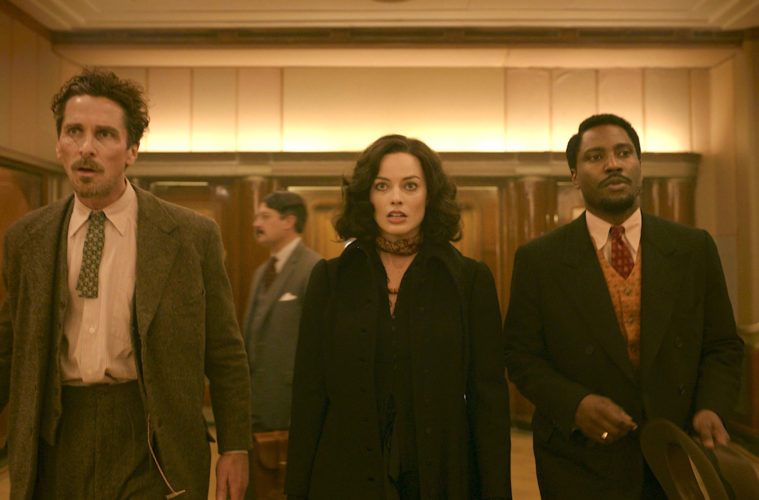 The city of Amsterdam, in the new David O. Russell film, serves as a kind of metonym for youthful bliss; specifically, the kind many shattered WWI veterans found after the Great War ended, drifting through a Euro springtime of booze, jazz, Modernism, and free-flying romance. Only a modest chunk of the film dallies there, but it’s a sweet idyll, as scarred Argonne Forest vet-buddies Dr. Bert Berendsen (Christian Bale) and Harold Woodman (John David Washington), along with their hospital nurse and budding artiste Valerie Voze (Margot Robbie), cavort, screw (Harold and Valerie are soulmates), and bond in a lost weekend they know can’t last forever.
The city of Amsterdam, in the new David O. Russell film, serves as a kind of metonym for youthful bliss; specifically, the kind many shattered WWI veterans found after the Great War ended, drifting through a Euro springtime of booze, jazz, Modernism, and free-flying romance. Only a modest chunk of the film dallies there, but it’s a sweet idyll, as scarred Argonne Forest vet-buddies Dr. Bert Berendsen (Christian Bale) and Harold Woodman (John David Washington), along with their hospital nurse and budding artiste Valerie Voze (Margot Robbie), cavort, screw (Harold and Valerie are soulmates), and bond in a lost weekend they know can’t last forever.
The movie Russell has constructed around them is, typically for the writer-director, a hundred things at once, and though it seems to muddle itself at times, with the director’s signature hullaballoo and off-kilter-ensemble vibe, it turns out to be a lovely thing—a nostalgic paean to friendship and selflessness. “A lot of this really happened,” an opening title reads—but not a lot, actually, just this: a non-event known on Wikipedia as the 1933 Business Plot (or, the Wall Street Putsch), in which a retired Marine general had alleged conversations with low-level representatives of Wall Street moneybags with the aim of staging a national coup and creating a Mussolini-style dictatorship, thereby preventing FDR from going nuts raising taxes on the rich and diverting resources to help the poor and jobless. The general testified before Congress to this effect, but everyone else denied knowing anything about it, and the matter was succinctly forgotten.Until now, pertinently enough.
Russell obviously bumped into this bit of neglected history and saw its fingerprints on our contemporary state of affairs. The film takes far too long to get to the meat of this conspiracy, and we could well wonder why in fact we’re following Bert, Harold, and Valerie back and forth from 1918 to the ’30s, where the one-eyed Bert is a drug-addled physician largely treating wrecked veterans like himself; Harold is a Black lawyer with only Black clients; and both are enlisted to help with an illegal autopsy of their old platoon leader (Ed Begley Jr.), who might’ve been poisoned.
Of course he was, and so there’s a plot afoot—our heroes are set up as suspects in a subsequent murder (Taylor Swift!) as Russell ropes in U.S. and Brit spies (Michael Shannon and Mike Myers, hilariously), a roaming assassin (Timothy Olyphant, unrecognizably), secret forced sterilization clinics, Valerie’s supercilious millionaire brother (Rami Malek), and, eventually, Robert De Niro, as the cagey general who agrees to help unveil the Fascists in their midst. Lushly shot and designed, Amsterdam is more than a little attention-deficit about its mystery plot, favoring instead Russell’s habits of insistent detours, character explosions, and seizures of pure invention.
This is where the trouble lies, for some reviewers. Like his ’90s Sundance brethren Paul Thomas Anderson and Quentin Tarantino, Russell obviously enjoys chewing the fat more than speeding through the courses, and his film is drowning in human absurdity, just beginning with Bale’s outrageous one-man show as contemporary cinema’s most magnificent mensch, sporting a perfect mid-century Borscht Belt accent, a ceaseless struggle with his glass eye, and a philosophical warmth that, in the end, envelopes the film. Bale has evolved into a deft chameleon: Bert Berendsen is an inspired creation, one you’re sorry to leave behind, as Bale makes even the man’s tics and mundane gestures riotous set-pieces.
Bale’s glitchy humanity is the movie’s glue, but nearly everyone is on this wavelength. Russell has yet to be appreciated as the actor’s director he is, adept at putting five people in a room and getting every one of them to do something surprising. Here, as in most of his other films (including American Hustle, also starring Bale), everybody is juiced and hitting the comic sweet spots, particularly Robbie, Malek, Myers, and Andrea Riseborough as Bert’s tightly coiled high-society wife. (Oddly, only Washington is left to be the cast’s one coolant.)
I didn’t miss the attention not paid to uncovering conspiratorial details; watching Bale’s beleaguered-but-unflinching sawbones tap on his eyeball and wooze up with experimental painkillers is movie enough. Let the clockwatchers go to another movie. Russell’s energetic ardor is palpable top to bottom in Amsterdam, and it’s hard to begrudge such a feverish movie its obsessions, which include early Modernist art-making (a little Man Ray, a little Duchamp), pioneering war-injury prosthetics, interbellum history, amateur ornithology, and, finally, anti-Fascism. I wouldn’t have missed the pro-democracy speeches that overwhelm Amsterdam in the end, had they been tacked back, but despite Russell’s strenuous efforts, you actually can’t have everything.
Editor’s note: The disclaimer below refers to advertising posts and does not apply to this or any other editorial stories. LA Weekly editorial does not and will not sell content.
Advertising disclosure: We may receive compensation for some of the links in our stories. Thank you for supporting LA Weekly and our advertisers.

